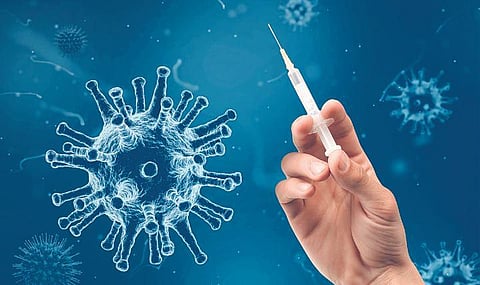

CHANDIGARH: Over 50,000 animals have been administered doses of the goat pox vaccine to check the spread of lumpy skin disease among cattle in Punjab.
State Animal Husbandry, Fisheries and Dairy Development Minister Laljit Singh Bhullar said over 2.33 lakh doses of goat pox have already been arranged and 1.67 lakh doses distributed in the districts and affected areas.
Punjab has witnessed cases of lump skin disease especially among cows.
Bhullar on Tuesday visited Jindanwala, Nabipur and Naushehra Pannuan villages in Tarn Taran district and listened to the problems of livestock farmers, according to an official statement.
"District deputy directors of the department have been instructed to immediately contact the head office for any requirement of vaccine so that the vaccination drive does not face any hindrance," said the minister.
As many as 673 teams of veterinary officers and inspectors have been constituted by the department and they are constantly engaged in vaccination and awareness campaigns, he said.
The minister stressed on following the guidelines of the government for the treatment and control of lumpy skin disease in the state, which include the isolation of affected animals, control of the movement of animals and farm workers, disinfection of farm premises and control of vectors.
Lumpy skin disease is caused by a virus of the capripox genus.
It spreads rapidly among cows and buffaloes through flies, mosquitoes and ticks.
It causes soft blister-like nodules all over the body, fever, runny nose, watery eyes, salivation, reduced milk yield and difficulty in eating.
Haryana will be conducting a mass vaccination of cattle, restrict their movement from one place to another and ban cattle fairs to arrest the spread of lumpy skin disease in the state.
Speaking in the state assembly, Animal Husbandry and Dairying Minister J P Dalal on Tuesday noted that 5 lakh vaccines have been ordered for the prevention of the disease in cattle, adding that the vaccines will reach the state by evening.
"We have procured the vaccines for immediate vaccination to the animals," he said while responding to the Calling Attention Motion moved by Opposition Congress MLA Amit Sihag.
The minister said the disease mainly affects cattle.
He said out of 62.92 lakh bovines (buffalo and cattle) in the state, 19.32 lakh are cattle.
Initial reports of the lumpy skin disease (LSD) were reported from Yamunanagar district in July last week.
Giving details of the total number of cases as on August 8, Dalal said the number of villages affected are 482, while 6,135 cattle have been affected and a number of deaths reported is 23.
He told the House that Sirsa district is the worst hit where 103 villages have been affected involving 825 cattle, while 19 cattle have died.
Ambala, Yamunanagar and Kaithal districts have also been affected, he said.
The last outbreak of the disease was reported in Hisar nearly a year ago, wherein 60 animals were suspected to be suffering from LSD, while it was confirmed in 12 animals after sampling.
Dalal said the disease has less impact in Haryana as compared to neighbouring Punjab and Rajasthan.
The department has also issued an advisory regarding this disease that the movement of animals should be restricted, while no cattle fairs be held for the time being, he said.
Farmers are being advised that the isolation of affected animals from other animals is of utmost importance.
The department is motivating farmers to spray insecticides to control flies, mosquitoes and external parasites.
To provide necessary information to farmers about this disease, 10 lakh pamphlets are being distributed.
Samples have been sent to the National Institute of High-Security Animal Disease (NIHSAD), Bhopal for testing, which is the lab approved by the central government for testing.
After the report of testing comes positive, necessary action will be taken to notify the disease, Dalal said.
Notably, the lumpy disease infects cows and buffaloes mainly through vectors like blood-feeding insects.
It leads to the formation of nodes on an animal's skin or hide that look like lumps.